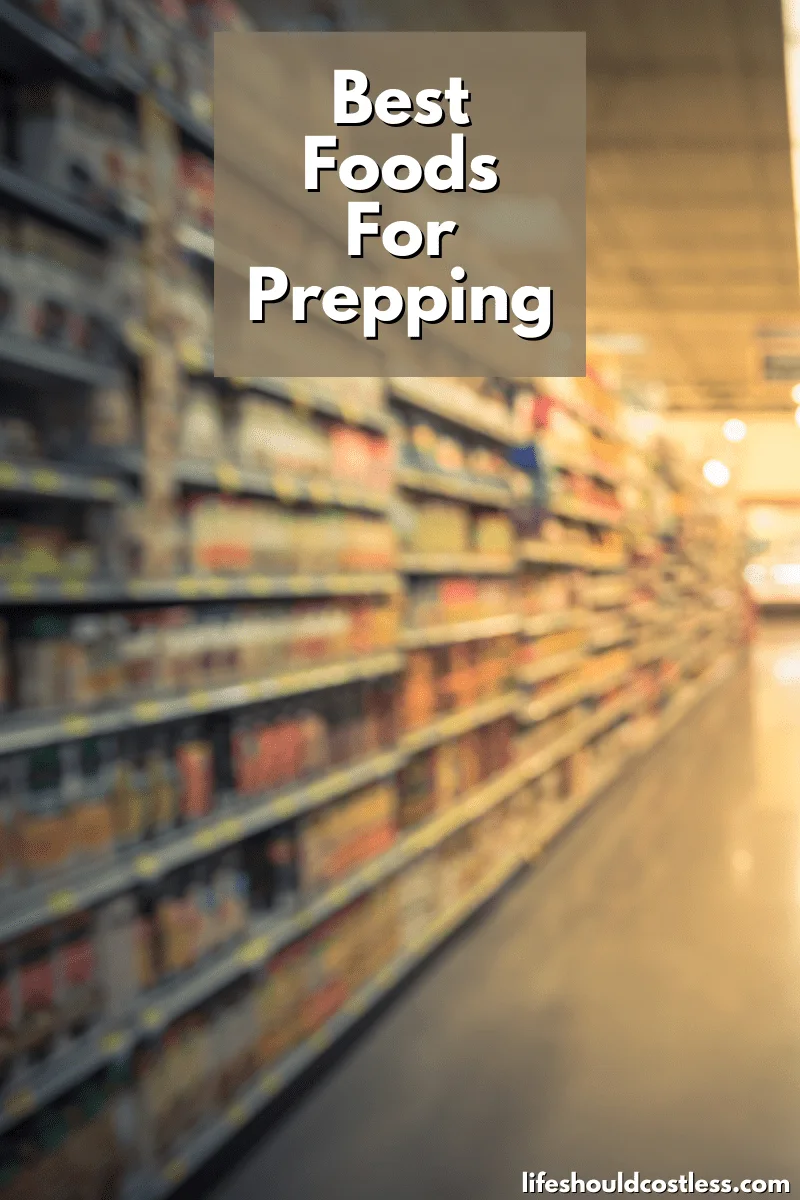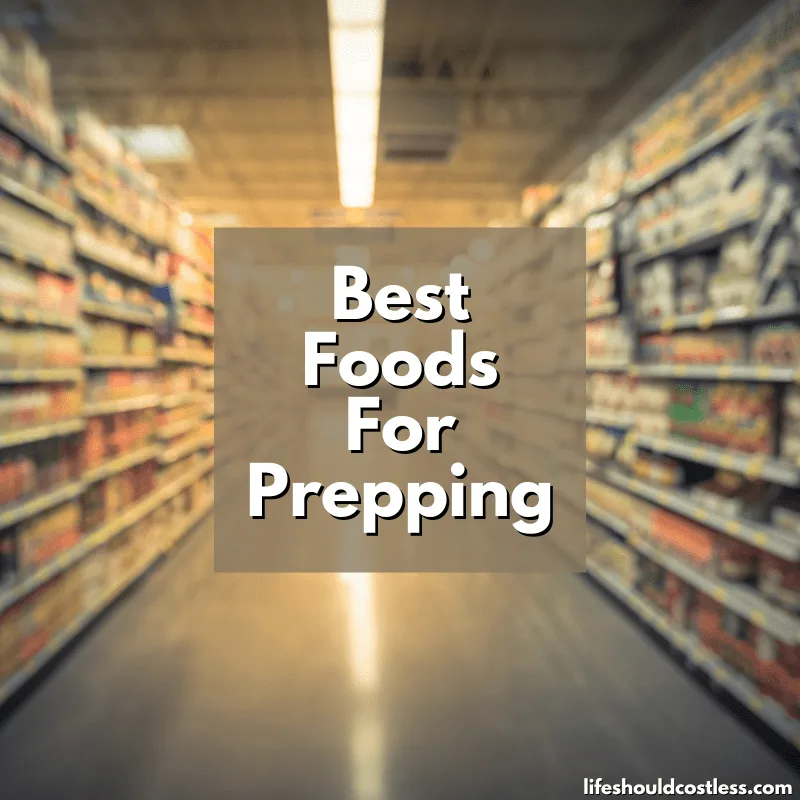Natural disasters, power outages, and other emergencies can happen anytime, and anywhere. Preparing for these scenarios is essential to ensure the safety and well-being of you and your loved ones. One of the most vital aspects of emergency preparedness is making sure that you have enough food for survival to last until help arrives. In this article, we will explore the best foods for preppers, including the best food to can and the best food to stockpile.

In addition to a basic emergency kit with go bag essentials, or an infant emergency kit, it’s important to make sure that we have additional food supplies on hand (beyond those needed for 72 hours) to prepare for some of the more catastrophic level of crisis situations.
**I do not claim to know everything on this topic, so please make sure to email me with any additional information that would be helpful to add to this article.**
Best Foods to Can Yourself
Home canning is a popular method for preserving food that can last for a long time without refrigeration, which is also known as shelf stable food.
It involves sealing food in an airtight container and heating it to a high temperature to kill any bacteria that may cause spoilage.
The following are some of what I would consider some of the best foods to can for emergencies:
Vegetables
Home-canned vegetables are an excellent addition to any emergency food supply. Vegetables such as green beans, carrots, peas, and corn are popular options for canning.
These vegetables are packed with essential vitamins and minerals, making them an excellent source of nutrition during an emergency.
When canning vegetables, it’s important to follow proper canning procedures to ensure the food remains safe to eat.
Fruits
Canning fruit is another great way to prepare for emergencies. Fruits such as peaches, pears, and apples are excellent for canning.
Home-canned fruit can be used for baking, making jams and jellies, or enjoyed as a sweet treat.
Canned fruit is also a great source of vitamin C, which is important for maintaining a healthy immune system.
Soups and Stews
Home-canned soups and stews are a convenient and nutritious option for emergency food supplies.
Soups and stews can be made with a variety of vegetables, meats, and grains. They are easy to prepare and can provide a satisfying meal during an emergency.
When canning soups and stews, it’s important to ensure that the food is cooked thoroughly before canning and that proper canning procedures are followed.
Meat
Canning meat is a great way to add protein to your emergency food supply. Meat such as chicken, beef, and pork can be canned in a variety of ways.
Canned meat can be used for making stews, soups, and casseroles.
When canning meat, it’s important to ensure that the food is cooked thoroughly before canning and that proper canning procedures are followed.
Beans
Canned beans are an excellent source of protein and can be used in a variety of dishes.
Beans such as black beans, kidney beans, and chickpeas are popular options for canning.
When canning beans, it’s important to soak them overnight before canning to ensure they cook thoroughly.
You can read my “Ultimate guide to soaking beans”, here.
Tomatoes
Canning tomatoes is a great way to preserve the fresh taste of summer all year long.
Tomatoes can be canned in a variety of ways, including as whole tomatoes, crushed tomatoes, or tomato sauce.
Canned tomatoes are a versatile ingredient that can be used in soups, stews, and pasta sauces.
In conclusion, home canning is an excellent way to prepare for emergency situations.
By canning your own food, you can ensure that you have a supply of nutritious and delicious food on hand in case of emergency.
Vegetables, fruits, soups and stews, meat, beans, tomatoes, and pickles are all great options for home canning.
When canning food, it’s important to follow proper canning procedures to ensure the food remains safe to eat.
With a well-stocked pantry of home-canned goods, you can be confident that you and your family are prepared for any emergency.
When home canning your food supplies, make sure that you are following all of the safety guidelines to ensure that no one gets sick from home canned goods.
Best Long Term Food For Storage
Canned foods are an essential part of emergency food preparedness.
They are convenient, easy to store, and are long shelf life food which means they are considered non perishable food items.
When home canning isn’t an option, or you just don’t have the time or interest, sometimes buying things in cans to store at home is your next best bet.
Here are some of the best store-bought canned non perishables food for preppers to have on hand and why:
- Canned Vegetables: Canned vegetables are an excellent source of vitamins and minerals, and can provide a quick and easy way to add nutrients to your emergency food supply. Popular canned vegetables include corn, green beans, carrots, and peas.
- Canned Fruits: Canned fruits are a great source of energy and can provide essential vitamins and minerals during emergencies. They are also great for snacking. Popular canned fruits include peaches, pears, pineapples, and fruit cocktail.
- Canned Meat: Canned meat is a good source of protein and can be used to create quick and easy meals during emergencies. Popular canned meats include tuna, chicken, and beef.
- Canned Beans: Canned beans are an excellent source of protein and can be used in a variety of dishes. They are also affordable and widely available. Popular canned beans include black beans, kidney beans, and chickpeas.
- Canned Soups and Stews: Canned soups and stews are a convenient and filling option for emergency food supplies. They can provide a satisfying meal during emergencies and can be used as a base for other dishes. Popular canned soups and stews include chicken noodle soup, beef stew, and chili.
- Canned Tomatoes: Canned tomatoes are a versatile ingredient that can be used in a variety of dishes. They are an excellent source of vitamins and can add flavor to any meal. Popular canned tomatoes include diced tomatoes, tomato sauce, and tomato paste.
- Canned Broth: Canned broth is a convenient and versatile ingredient that can be used as a base for soups, stews, and other dishes. It can also be used to add flavor to other foods. Popular canned broths include chicken, beef, and vegetable.
Having a good supply of canned foods on hand is essential for food survival.
Canned vegetables, fruits, meat, beans, soups and stews, tomatoes, and broth are all excellent options for long term storage food.
They are convenient, have a long shelf life, and can provide a good source of nutrition during emergencies.
Remember to rotate your canned items of food regularly to ensure freshness and to check expiration dates before consuming…and make sure you have a few quality can openers in your possession as well.
Stockpiling Food FAQ
Stockpiling involves buying and storing food that can last for a long time without refrigeration and it’s a method of prepping for events that are a bit more on the extreme side.
The following are the best foods to stockpile for emergencies:
Canned fruits and vegetables: These have a long shelf life and are packed with essential vitamins and minerals.
Dried beans and legumes:
These are an excellent source of protein and can be stored for a long time.
Nuts and seeds: These are high in healthy fats, protein, and fiber and can be stored for months.
Whole grains: Rice, quinoa, and oats are good sources of carbohydrates and can be stored for a long time.
Canned meats and fish: These are a good source of protein and can be stored for several years.
Nutrient-dense powders: Powdered milk, protein powders, and other nutrient-dense powders can provide essential nutrients in a compact, easy-to-store form.
Freeze-dried fruits and vegetables: These are lightweight and can be stored for up to 25 years.
Shelf Stable Fats/Cooking Oils: Coconut oil has a long shelf life and is resistant to rancidity. It is also a healthy fat that can provide energy during emergencies. Olive oil is another healthy fat that has a long shelf life. It is also versatile and can be used in a variety of dishes. Vegetable oil is a common cooking oil that has a long shelf life. Canola oil is a healthy cooking oil that has a long shelf life. It is also a good source of omega-3 fatty acids. Peanut oil is a flavorful cooking oil that has a long shelf life. It is also high in monounsaturated fats, which can help lower cholesterol levels.
Make sure that you also have a stockpile of any vitamin supplements that you may need if you may not be able to get all the nutrients in that you may need for optimum health.
Conclusion
Preparing foods for survival in case of major life emergencies is important to ensure the safety and well-being of you and your loved ones.
Canning and stockpiling survival food can provide a reliable source of nutrition during catastrophic emergencies.
Remember that some of the best foods for preppers include long shelf life foods such as fruits, vegetables, soups and stews, rice and grains, canned meat and fish, and nuts and seeds.
Additionally, canned foods such as fruits, vegetables, and meats are great for emergency food purposes too.
So, watch for case-lot sales and make sure to stock up on things that you will actually eat ensuring that your purchase will not go to waste.
*Keep in mind that I am just a human writing my opinions on thi subject. Always use your best judgement and do what is right for you and your particular situation.
Thanks so much for stopping by my blog and supporting my endeavors to make people’s lives a little easier/better/more affordable.
If you liked this post, or found it helpful in any way, please make sure to share it with your family, friends, and co-workers via social media.
Or you could even send them the direct link via email. Whichever way you choose to spread the love, I super appreciate it! ~Sarah

How To Follow & Support This Site
- If you would like to subscribe to my email list, go here.
- Make sure to follow along via social media, by going here.
- If you would like to learn how to really show your support to this site (at no cost to you), go here.
- If you would like to make a direct donation to the site, go here.
Check Out My Other Content
- To see all of my home-making related articles, go here.
- To see all of my emergency prep/ homesteading related articles, go here.
- To see all of my recipes, go here.
- To see all of my other kitchen tips/food helpers go here.
- To see all of my non-food recipes and home remedies, go here.
Here are direct links to several of my other posts that you may also find helpful:
Various kitchen helpers/tips
Other prepper / homesteading related articles:
Other Helpful Resources
Here are some other great places to look on the topic:
- https://theprepared.com/homestead/guides/supermarket-food-list/
- http://www.happypreppers.com/37foods.html
- https://www.realsimple.com/food-recipes/shopping-storing/emergency-foods
* Please note that this article was originally shared to this website on 04/24/2023, and has since been/will continue to be updated to improve user experience, remain relevant, as well as to be as shareable as possible across the social medias.
